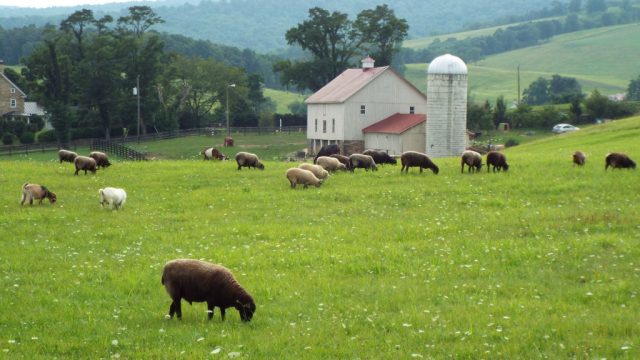‘Conservation’ rule fuels land war in Fauquier

NATURE’S WAY: Goats, sheep and other animals graze at Paris Farm, which has become a battleground over a “conservation easement.”
By Kenric Ward | Watchdog.org Virginia Bureau
PARIS, Va. — A Fauquier County farmer is accusing an environmental group of trampling her livelihood.
“Our freedoms, property rights and economic liberty are at risk every moment of every day,” said Martha Boneta, who has been wrangling with the Piedmont Environmental Council for eight years.
The dispute centers on a “conservation easement” that covers Boneta’s 64-acre Paris farm.
PEC alleges that Boneta’s agricultural activities violated the terms of the easement, which the PEC enforces on behalf of the Virginia Outdoors Foundation.
The PEC’s demands ranged from construction of a farm fence to the removal of a spray nozzle on a hose.
GOT HER GOAT: Martha Boneta, owner of Paris Farm, is fighting an environmental group for use of her land.
Boneta fired back with a lawsuit contending that PEC is overstepping its authority at the farm she bought in 2006.
Saying she has encountered “eight years of consistent, continued harassment,” Boneta said she was ordered to fence off nearly half of her farm on the basis that it was “hallowed” ground.
“Only later, after we installed the fencing, did (PEC) say they had no right to make that demand,” she said. Her costs were not reimbursed.
“It breaks my heart that my family and I have had to endure years of suffering and hardship,” Boneta told Watchdog.org in an interview.
PEC attorney Diana Norris would not discuss the pending litigation, but said Boneta had “full knowledge that PEC had a conservation easement” on the land.
Norris said a settlement agreement from a 2009 case “confirmed the validity of PEC’s easement on the property,” as well as PEC’s right to conduct “monitoring visits.”
A recent court ruling in neighboring Loudoun County could bolster Boneta’s position. Circuit Judge Burke McCahill sided with Chrysalis Vineyards in its fight against restrictive easements held by Ducks Unlimited.
“Martha should be the poster girl for what (the PEC) says it stands for,” said Tom DeWeese, director of the conservative American Policy Center. “Farmers are the greatest protectors of the environment.”
DeWeese suggests that landowners in Boneta’s position be allowed to opt out of restrictive and loosely worded easements, which generate tax credits for the organizations holding them.
The American Policy Center has posted an online petition calling for a congressional investigation of PEC’s nonprofit status.
Boneta, whose farmhouse has been videotaped by PEC operatives from the inside, calls conservation easements tantamount to a “bait and switch” for small agriculturalists in her situation.
In a statement, she declared:
“When an American family purchases and invests their hard work, sweat and love into a 64-acre farm zoned rural-agricultural, and then are told they can’t even engage in traditional agricultural practices, it is bait and switch.”
Boneta noted that her property is in “an agricultural county in a ‘Right to Farm State,’ with an easement that permits agriculture, commercial and industrial activity.”
With passage of the eponymously named “Boneta Bill” at the 2014 General Assembly, state lawmakers affirmed the right of Virginia farmers to grow and sell produce on their land with a minimum of government interference.
Nevertheless, Boneta said she feels pressure from PEC and its political allies on a daily basis.
“No family should ever have to suffer this way,” she said.
Read an earlier Watchdog article about Boneta’s battle with Fauquier County officials.
Kenric Ward is a national reporter for Watchdog.org and chief of the Virginia Bureau. Contact him at kenric@watchdogvirginia.org or at (571) 319-9824. @Kenricward








